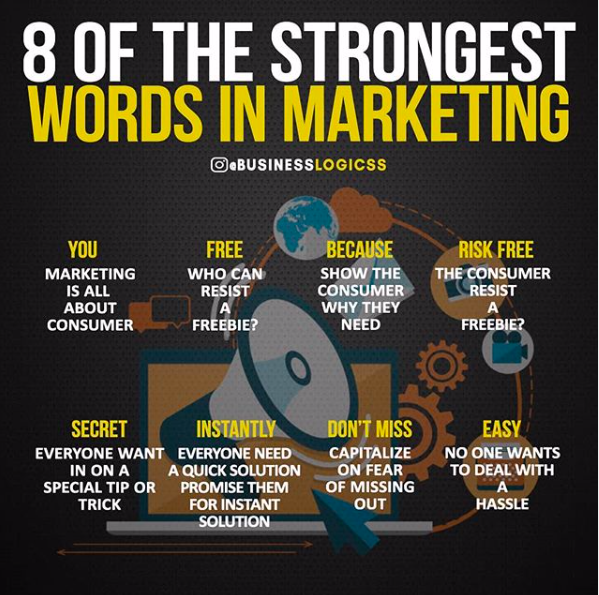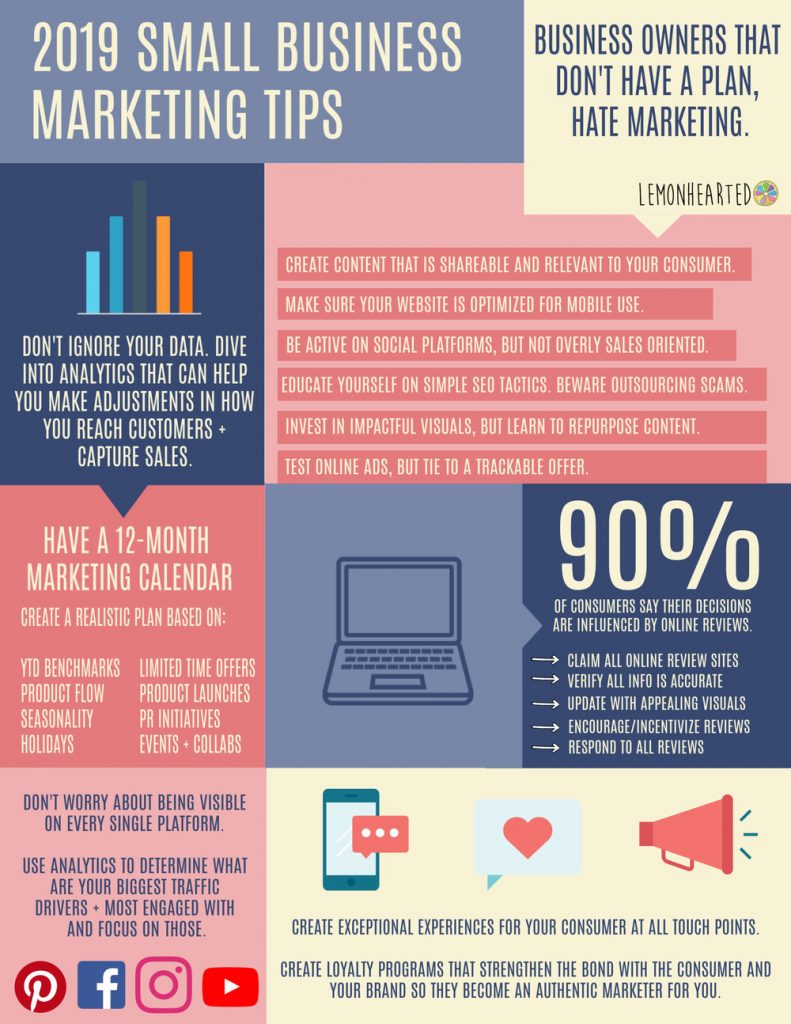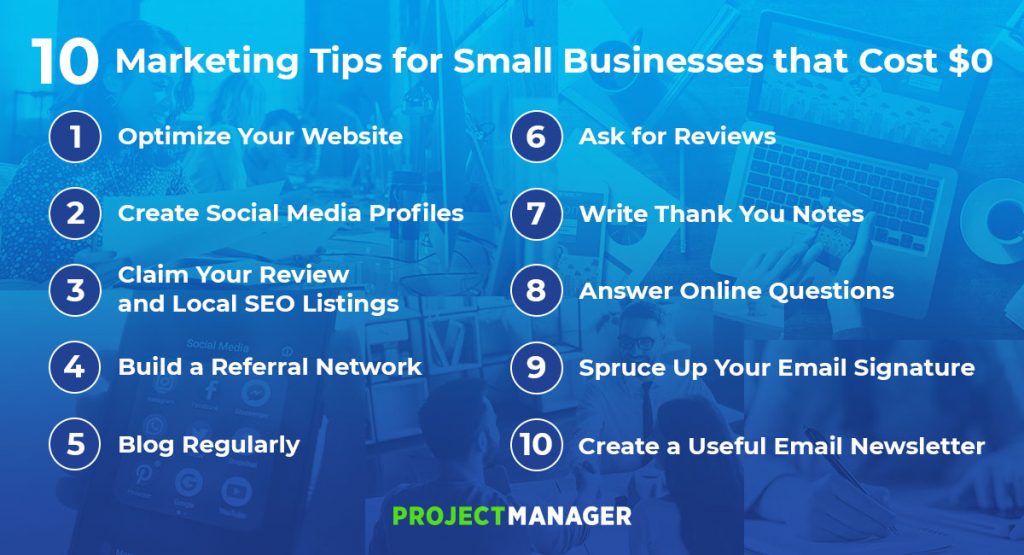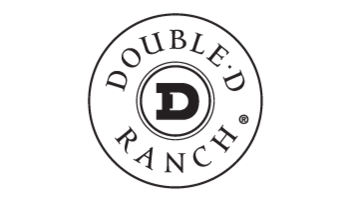
1. You
Marketing is ALL about the consumer. You’ll want to take “you” (yourself) out of the equation and make it all about “you” the consumer. Focus and tailor your business model and lingo around how you and your business can help the consumer.
2. Free
It’s no secret that we all love free crap, right? This doesn’t mean that you have to give your entire business or products away for free, but entice people in the door with a freebie. Offer them a free consultation, recommendation, etc.
3. Because
Show the consumer why they need you, your business, and/or your products. What makes you better than your competition? Why should they choose over someone else? Well, because…. and fill in the blanks! You can use things like “well, because in the last 5 years we’ve had X amount of success with Y amount of clients. They’ve achieved Z in their own lives or businesses.”
4. Risk Free
This ties back in with your freebie. Who can resist not only a freebie, but one that’s also risk free? Show them they have nothing to lose by giving you a chance.
5. Easy
Nobody wants to deal with a company or person that’s a pain in the ass. Nobody wants a complicated system to get results either. They want you to take their business from the slow lane to the fast lane (or whatever they’re after) in as little steps as possible. Make it easy for them! Show them results and show them that the process isn’t that complicated… However, make it obvious that even though it’s simple, they can’t do it themselves :). They need an expert aka YOU!
6. Don’t Miss Out
Capitalize on FOMO. Nobody wants to miss out on a great deal or something that can change their lives. Capitalize on this! However, you need to tread carefully here. Come off too strong and they’ll high-tail it away. You know those pushy vendors in the mall that say things like, “if you walk away from this deal it won’t be here tomorrow?” or “I only have like 3 of these left?” Yeah, that marketing technique works for some but for most of us it’s tiresome and old news. Leave an offer on the table with a time limit, but be modest about it. “I’m sure we can help you out! Why don’t you think about our services and if you decide to go with us, we’ll keep what we discussed on the table for 30 days.” or “Think it over and if you email us within the next 48 hours, we’ll throw in a bonus!”
7. Instantly
We live in a world of near instant gratification. Your business model should aim to achieve the same if possible. Assure your client that not only will you get them results, but you’ll get them results FAST. Let them know that you can solve their problems in little to no time; something your competitors can’t offer.
8. Secret
Everyone LOVES a good secret! And this includes your clients and prospects. Offer your clients secret tips, tricks, and tools of the trade that you ONLY share with those in the “know”. “Hey! I got a little trick for you that I think will REALLY help out. My business partners would kill me if they knew I was sharing this detail with you, so let’s keep it between us, ok? :)”
Let’s face it. We never achieve anything in life until we are motivated enough.
Without motivation, achieving our goals is next to impossible.
Just imagine trying to lose weight when you’re unmotivated. Without having any motivation, you can’t just start losing it (unless you chant some magical mantra that automatically makes you lose weight).
And do you know what the worst part is?
The feeling of being unmotivated gives a boost to unpleasant feelings such as guilt, procrastination, and stagnation. On the other hand, feeling motivated makes you feel full of energy, alive, and more focused on your goals in life.
It wouldn’t be wrong to say that motivation is the factor that can make or break you in your professional life, too.
If you don’t have the motivation to excel at work, your work will always turn out to be mediocre, and you will never stand out from your colleagues.
As the title of this post suggests, the best way to get motivated is to do it yourself. Don’t wait for others to push you hard or to motivate you.
You alone have the power to motivate yourself. It’s your life, take ownership of it, don’t take a backseat, as no amount of motivation coming from others can be half as effective as you motivating yourself. You know yourself better than others, so you’re capable of motivating yourself better than others can.
Compiled below are a few helpful pointers to help you stay motivated.
1. Focus on Yourself, Don’t Compare Yourself to Others
Do you know the best way to give up hope? Just compare yourself to others; this will work as the quickest way to de-motivate you.
When you compare yourself to others, it means you don’t accept yourself or see any goodness in you, and making a comparison of yourself to others is an insult that can completely make you lose confidence in yourself, thereby giving up hope completely. Rather, you need to keep your focus on yourself ONLY.
You need to focus more on how you can improve yourself as a person than focusing more on others, and wasting your precious time and energy only to get de-motivated in the end.
As Judy Garland puts it,“Always be a first-rate version of yourself, instead of a second-rate version of somebody else.”
2. Live in the Present, Not in the Past
You must have often heard the phrase, “Live in the moment.” But what does it mean?
It means that you should live and enjoy the present moment, rather than dwelling on the past.
You won’t gain anything from looking back at the past, what has happened, has happened. What is done can’t be undone. Because according to Kay Lyons Stockham,
“Yesterday is a canceled check; tomorrow is a promissory note; today is the only cash you have – so spend it wisely.”
We indeed tend to live more in the past than in the present. We focus too much on what has happened or might happen that we stop living in thepresent moment. While you can’t control your past or future, you can certainly take control of your present.
As Steve Maraboli rightly said,“Cry. Forgive. Learn. Move on. Let your tears water the seeds of your future happiness.”
3. Replace Negatives with Positives
Don’t let negativity get into your head.
It’s okay to allow yourself to express your emotions, but don’t spend a lot of time on them.
As we all know, negative thinking is unproductive and makes it almost impossible for you to let go of your past and focus on positives in your life.
Negative thoughts are the cause of self-sabotaging thoughts in your mind, which never let you live a happy, fulfilling life.
That’s why it’s extremely important to guard your thoughts, when a negative thought crosses your mind, push it away, or replace it with a positive one. Think of an accomplishment or the positives you have gained from experiences in life.
According to Willie Nelson, “Once you replace negative thoughts with positive ones, you’ll start having positive results.”
4. Be more Organized, Create To-Do-Lists
Being organized can pay off in more ways than you can possibly think of. Initially, getting organized may appear tedious, but trust me, once you are more organized, things will start falling in place naturally.
And honestly speaking, when your workplace is more organized and clutter-free, not only will it greatly increases your productivity, it will also help you stay on the right track and help you stay motivated.
You can do the following things to be more organized.
· You can maintain a manual to-do-list.
· Set yourself reminders.
· Use online apps such as Trello, Google keep and Cortona
· Divide your work into smaller chunks with a dedicated deadline
· Categorize your tasks into “Urgent” and “Most Urgent.”
· Create long and short term goals.
5.Don’t Sit Idle, Take Action Every day
Believe it or not, sitting idle is the greatest source of de-motivation. An idle mind is said to be the devil’s workshop, so, make sure that you never sit idle. It can lead you to the road to de-motivation. A daily step towards your goals makes a real difference and accomplishment of your goals easier.
6. Take out Time to Reflect
While it’s extremely important for you not to dwell on the past, taking out time to reflect upon what has already been achieved will give you a sense of accomplishment and make you go on in perfect harmony. Often, we are too hard on ourselves, always criticizing ourselves, always looking at what’s left undone than noticing and admiring how much we have already achieved.
So, to motivate ourselves, we need to stop the negative self-talk and take out time to celebrate our accomplishments, appreciate our great efforts with a big pat on our back saying this aloud, “You made it, I am so proud of you.”
7. Embrace Your Failures as Much as You Embrace Your Success
Now, there’s one thing with failures – we don’t embrace them. Now, I know this one can be a tough nut to crack. We all feel like giving up when things are not going as planned or when we end up making a mess of things.
So, it’s important to keep in mind, while failure is inevitable, how we deal with it mainly depends on us. We have to make a smart choice here: should we see failure as a setback? Or can we learn from it, and do even better afterwards?
8. Don’t Worry, Work on the Solution
Honestly, we worry too much.
Perhaps, deep inside, we unconsciously believe that if we “worry enough,” we can prevent bad things from happening to us. Little do we realize the fact that worrying can affect our bodies in more ways than we can possibly think of. Worrying excessively can lead to high levels of anxiety and can even cause a person to be physically ill.
Worrying doesn’t solve any problem in the world. Instead of just worrying, it would be wiser to come up with an action plan, figure out what can be changed, and go ahead and change it. Once you are done with the solution, practice calmness, and carry on with your life.
9. Be Thankful for Criticism
To be honest, very few people dare to face criticism, especially when it comes to work or something that they worked hard at.
We might hate to receive criticism, but we can’t deny the fact that criticism allows us to grow so much.
What is criticism? It’s feedback. Without feedback, you can never learn or grow. Criticism opens our eyes to a new perspective or ideas that we may have otherwise overlooked or would never have considered.
Constructive criticism is crucial, whether it’s a thorough review of our work or a performance review, the feedback can give a boost to our performance (provided you take it positive), and help us grow a great deal by shedding light at every aspect of our work, and thereby giving us the opportunity for improvement.
So instead of making a great deal out of criticism or getting demotivated, we should rather be thankful for it as there’s no better way to improve than listening to people’s feedback.
If you ask me, being a writer, I am always ready for criticism. I always ask people to be honest with their feedback and rate my work accordingly. I even encourage them to go ahead and criticize my work. This is because I believe, for a person who wants to grow professionally, criticism serves as golden nuggets which help him/her improve a great deal.
Come to think of it, without criticism and feedback, how would you know what’s wrong with your work or what areas of your work can be improved upon?
10. Find Your Inspiration
Don’t expect others to motivate you. Let me break it to you, “You will have to find your own inspiration.” Nobody cares about the shit you are going through; everyone is busy fighting their own battles.
So, stop feeling pity for yourself or stop expecting someone else to inspire or motivate you.
You would have to do the hard work yourself. You have to somehow find ways to motivate yourself.
You need to find out what works best for you, and you have a number of options to pick from. You could try watching TED talk videos, enrolling in a self-development course, joining support groups, or traveling and exploring the world by yourself. You can also click here to get the full list of 12 Ways to Stay Motivated for extra tips to try out.
The bottom line is you just have to figure out ways to re-energize yourself and keep going.
“It does not matter how slowly you go, as long as you do not stop.” — Confucius
If you aren’t, why the hell not?! 🙂 Join today and get a FREE account at our Hero Analysis.
You’ll also find valuable insights, direct feedback from the company, live streams full of useful content, and more. You’ll also be able to network with other small business owners!
https://www.facebook.com/groups/BeAHeroBeLocalMarketingAgency/

All good pieces of advice! While you do want to focus on being present on *all* forms of social media platforms possible, you’ll want to divert the bulk of your attention to the platforms where people are engaging with you the most. However, don’t count your “low” platforms out! There have been plenty of times where I’ve considered quitting a social media platform because it’s dead only to get clients and attention from seemingly nowhere!

- Optimize your website- While you can certainly shell out money here, why not DIY? Look at your SEO and focus keywords and see how you can improve them. Can you also improve your website’s layout/content? Do you have a blog? If not, add one!
- Create social media profiles- Presence is a BIG deal for small businesses and you should be taking advantage of ALL of the social media platforms out there. You never know where your next client will come from!
- Claim your review and local SEO listings- Pretty self-explanatory. SEO is huge for getting your business out there.
- Build a referral network- Remember when I said that networking was one of the most important things you can do? Yeah, that still applies and you should work your referrals into that mix!
- Blog regularly- You want to be present and you want to be active. Both of these are attractive to customers and blogging is a great way to pull people in.
- Ask for reviews- Shane Brooks covered this one in detail but let’s gloss over it: reviews are incredibly important for your business. When deciding between you and your competitors, your reviews and ratings are what’s gonna ultimately sway your audience.
- Answer online questions- This one is pretty much a no-brainer. You want to respond to any and all questions that are posted online regarding you, your business, and your products. Not answering might make you look “shady” or like you don’t know what you’re doing.
- Write thank you notes- For reviews, purchases, blog feedback, etc. People love feeling like they’re appreciated so let your customer base know that they matter!
- Spruce up your email signature- A lot of people are guilty of this and admittedly, I was too! It’s not really enough anymore to sign your emails “Thanks, [your name here].” Instead, add your contact info, your business, and even a short personal message: “Thanks, [your name here] CEO of [Business Name], [Contact Info], Dedicated to helping YOU succeed!”
- Create a useful email newsletter- Okay, so this one you need to be careful on. Not everyone appreciates having their emails flooded and most hate email ads in general regardless of how infrequent they are. However, regular emails are a great way to keep your audience informed of what you’re up to and at the forefront of their minds. So create an email newsletter that features some of your recent accomplishments, what you’re up to, advice, etc. and send it out at max once a week. Ideally, maybe once every two weeks or once a month.
Big Shoutout to Shane Brooks for this gem!
So you’ve racked up the Facebook review points, and now it’s time to look into getting Google review karma points. You might be tempted here to assume that your Facebook reviews are enough but unfortunately they aren’t. Google doesn’t really factor those reviews into, well, ANYTHING! Sure, they might show up when searching for your business, but you know what shows up first and foremost? Google reviews!
With that being said, it’s time to start looking into getting some reviews on Google. Not sure how to approach your old clients? Use Shane’s example below:
Hi [First Name],
I just started working with [Business Name] and saw your 5-star review on their Facebook page.
If it is not too much trouble, could you please leave them a 5-star review on Google? I know it would mean so much to [Owner Name] and the whole team to have your recommendation there. It’s super easy to do and should only take 2 minutes tops ?
This link will take you to our page to leave a review: https://g.page/example/review
Wishing you the best,
Shane
Now, this is not rocket science but every single review counts! So start working hard for those Google reviews!
Finding your niche is one of the most important steps to success in the world of business and marketing. Your niche will define your future, your success, and ultimately your happiness. So make it count! While you definitely want to go for something that you’re good at, you also need to make sure it’s something that you enjoy. Being passionate about your job will not only inspire you to keep at it, but that passion will also help grow your customer base and increase your success.
It should be the first step you take as well. After all, you need a starting stone right? Can’t be a successful business owner if you don’t know your niche! However, it can be an extremely overwhelming and daunting task. There are a ton of ideas out there and a lot of them have already been done. In some cases, the demand for such a task has already been addressed too. So it’s up to you to find something that not only works, and that you enjoy but something that isn’t oversaturated. Otherwise, you might get lost in the competition.
So how do you get over this early hurdle? Well, I’ve got some important tips and strategies that will help you find the perfect niche. And this niche won’t just make you peanuts either!
#1 What makes a good niche?

Before we get started with some of the tips, we should first talk about what makes something a good niche to invest your time in. Keep in mind that for every good one out there, there are a dozen bad ones. And obviously those are the ones that we want to avoid.
What is a niche?
“A small but profitable segment of a market suitable for focused attention by a marketer. Market nichesdo not exist by themselves, but are created by identifying needs or wants that are not being addressed by competitors, and by offering products that satisfy them.” –Business Dictionary
A niche is where there is demand but little supply. Think of it as your own little hidey hole in the market of your choice.
Keep in mind that a good niche will tick3 boxes:
✔High sales (demand)
✔ Low customer service requirements
✔ High profit margins
The first one is probably pretty obvious. You don’t want to pick something where the demand/sales aren’t that high. Even if it’s something that you absolutely love, at the end of the day you also have bills to pay.
Low customer service requirements is also something you want to keep an eye out for. Ideally, you want to “get in and get out”. The less time you spend interacting with your customer base, the more time you can invest in your business and yourself. Keep in mind that this doesn’t mean that you should completely avoid your customers or take a backseat! If your clients have questions, answer them. If you get emails about your products, respond to them. However, you should definitely look for options that limit your interactions. Time is money friend!
High profit margins is another no-brainer. You have bills to pay. And your niche is supposed to pay them. Ideally, you want to find something that requires as little time/effort as possible and has a big profit margin. You definitely don’t want to spend more than you’re making either! But you probably already knew that.
#2 Target market

You also want to consider your audience when looking for the perfect niche. There’s an audience for nearly every niche out there, but you want one that’s going to shell out more than just peanuts. So generally speaking, you want to aim for:
Upper middle class consumers who aren’t going for products with mass appeal.
These customers are looking for something specific and they’re more interested in luxury and quality than they are anything else. The upper middle class also has more money to spend than a lot of other customers so consider fields that appeal to this group. And since they’re interested in luxury/quality rather than brands, you can easily wiggle into their sights.
Keep in mind too that even if you find a small niche, chances are you’re going to have competition. So offering quality products or luxury goods are going to be the key to your success. Also, if by some marketing miracle you don’t have competition in your field, you still want to make sure you’re offering clients something of high quality. If you’re shelling out cheap goods and services, clients probably aren’t coming back… Even if you’re the only game in town.
The product of service musteither high quality or meet the demand for high quality. Need some help making sure your products are of value? Check out this linkfor suggestions on making sure that what you’re offering your clients is the best out there.
#3 Brand loyalty

Let me start by saying that brand loyalty is something that you want to avoid at all costs.
Don’t look to sell products where your competition relies on brand loyalty (e.g. smartphones, drink products such as Coca Cola, etc.). Why? Well, customers are loyal to the brand and since your company falls outside of that, then you’re going to have a hard time building a client base… If you can build one at all. Pretty simple.
But what if there isn’t a ton of competition in the field? Tempting, but you still need to avoid it like the plague. As I said, customers are going to be loyal to the brand of their choice. Even if there are only two major competitors and you think there’s room for you there isn’t.These two brands are already established and they have their customer base. And those customers are loyal to that specific brand, meaning they’re not interested in you. Even if your products are somehow better than the major competitors, you still shouldn’t expect the market to jump ship. Hence, brand loyalty.And some “newbie” isn’t going to dethrone them anytime soon.
So try to find a niche where customers aren’t concerned with brands, but rather they’re interested in the type of product. If your customer base cares more about whose brand is on their product than they do the quality of it, that niche isn’t for you.
#4 Take your time

Coming up with the absolute perfect niche isn’t going to happen overnight. It’s also not likely to be a “eureka” moment. Rather, it’s going to come about as the result of some in-depth research and brainstorming. So don’t worry if the perfect niche doesn’t come to you within a matter of hours (or days).
Also, don’t jump at the first “perfect niche” that comes to mind.While it might sound like a great idea at first, you need to sit with it for awhile. Once again, do some research and evaluate your idea.
· Does it tick the 3 boxes we talked about earlier?
· Is it in a field you’re passionate about?
· Is there brand loyalty there?
· What’s the market like?
· Is there room for you?
· Can you make a living off this idea?
So take your time! Do your research, talk to others in the field, go through the checklist, and really evaluate your niche for what it is. This is something that ideally you’re going to do for the rest of your life so don’t rush it.
#5 Remember that success takes time

Just like you won’t find the perfect niche overnight, success also won’t happen in the same time span. It can take awhile for your idea to take off and for customers to find you. Let me share a story with you:
My friend Alicia thought she’d found the perfect niche in the photography field: pet portraits. It was kind of a strange niche, but a lot of people seemed interested in it right off the bat. She also knew that there wasn’t a lot of competition out there. After some extensive research, Alicia launched her website and entered the field. Right away, she got a client and spent a few hours photographing their dog. They were extremely happy with the results and then… Nothing. Her inbox and cell phone sat empty for a long time.
Alicia was starting to become convinced that maybe this niche wasn’t that great at all. Then, an email appeared: “my friend recommended you! I love the photos you took of her dog and I’d like some done of my dog as well. She’s very close to passing away, so I’d like to commemorate her.” Photographing dogs that were sick or close to passing wasn’t exactly her original plan, but Alicia found a lot of success in it.
So be patient! Rome wasn’t built in a day and chances are your business isn’t going to be either. Your niche may also change slightly and it might take time for you to get your business off the ground. You can give yourself a bit of a leg up though by following some SEO tipsto boost your website traffic.
#6 Think outside the box

One of the biggest mistakes people make when it comes to looking for a niche is to opt for a very common one or something that is just “too out there”to meet any real demand.
Let’s talk about oversaturation first. There are plenty of areas out there that generate a lot of appeal because they feel very niche. However, in reality they tend to be way over-saturated. Photography is one of those areas. A lot of niches within this field are full to the point of bursting. Creative photography being one of the most full. This isn’t to say that you can’t make a living in the market, but you gotta think outside the box. Remember Alicia? Take a page out of her book and look for something unique.
How can you tell if the market is too saturated for you? Well, take a look at your competition. How much competition is there? If there are thousands, then yeah there’s probably no room for you. You can also reach out to others in the field and see how business is going for them. Is it slow? Steady?
Now, let’s talk about going “too far outside of the box.” Don’t think so far outside of it that you think yourself into a niche that only appeals to a small few (or none). Referring back to Alicia, pet photography appeals to a very small portion of people. There’s not a big demand for it and honestly, that demand could probably be filled by a regular photographer.
#7 Do your research

While we’ve covered this in a few of the other sections, I personally think this is one of the most important aspects of finding the perfect niche. And it’s also one that tends to get neglected.
The last thing you want to do is invest a lot of time, energy, and even money into a niche that isn’t going to work. This is where research comes in. Even if your niche is a completely brand new idea that nobody else has ever thought of before (doubtful, but play along) there is still research to be done:
· Once again, does your niche tick the 3 boxes we talked about earlier?
· Is brand loyalty going to be an issue?
· How’s the market in the field?
· What’s the customer base like? (Do they have money to spend? Are they interested in quality/luxury goods?)
· Is there enough room in the market for you?
· Is this a profitable field? (If not, then your niche probably won’t be profitable either).
· Will your niche be viable?
I’m sure you’ll come up with more questions that need to be answered, but these should be your starting point. Also don’t be afraid to ask for advice and input from others in the field. For the most part, small business owners are more than happy to answer questions and offer advice; after all they’ve been “at the bottom” before too. There are also forums, blogs, and tons of resources available out there so take advantage of them!
#8 Go into a field that you love (and understand)

Once again, your niche will ideally be the job you do for the rest of your life or at least a very good portion of it. So pick something in a field that you actually enjoy!
If you pick a field that you actually like, then not only are you more likely to keep at it, but you’re also more likely to put your heart and soul into your business. This means higher quality goods/services for your customers, repeat clients, and a good amount of success. It also means that instead of waking up every morning with the “great, another day of work” sentiment in the back of your mind, you’ll wake excited for each new project.
However, don’t go into a field that you don’t understand at all; even if it’s something that looks interesting to you. Coding might really appeal to you and while there’s a high demand out there for coders, this market won’t benefit you if you can’t code. Sure, you can learn but you’ll want to do that before you enter the market. Your niche should also be something that you’re good at. Sure, you can probably pick up coding pretty fast, but will you be able to solve difficult problems that require more than just a basic understanding of the field?
Your clients aren’t guinea pigs that you get to practice on; you should deliver goods and services that you understand.
So ideally your niche will be in a field that you’re good at as well as enjoy.
#9 Test your idea

This is another area that a lot of people neglect and that’s unfortunate. Maybe it’s the thought of diving headfirst into an exciting new field that causes their brain to forget this crucial step or maybe they don’t think it’s that important. Well, I’m here to tell you that it’s crucial.
Once you’re armed with all of the information and tools you need to launch your niche, you need to test it.How? It’s pretty simple. One way you can do this is by setting up a landing page for pre-sales of the services or products that you’re working on. You can then drive your traffic to this page via paid advertising. It’ll cost you a bit more upfront, but the feedback you get is invaluable. You can see how much demand there is for your products/services without investing a ton of resources.
But what happens if you don’tget pre-sales? Well, this doesn’t necessarily mean that it’s time to hang up your hat. Your niche might still be valuable, but you can use this insight to see where you essentially “went wrong.” Maybe your messaging is off, your offer isn’t that enticing, you need more advertising, or your niche needs to be refined. “By leveraging the A/B split testing, you can optimize conversions and find out whether or not there is anything stopping your target market from taking action.” –Thomas Smale
You can check more of Smale’s tips here.
#10 Don’t be afraid to alter your niche

Okay, so you’ve followed the above tips. You’ve found a good niche that you think will be successful in a profitable market and you’re ready to begin your adventure. However, you end up going weeks and maybe even months without much business. What do you do now?
Remember Alicia? She entered a pretty full market but found a unique niche. However, her niche was a little too unique. She didn’t attract much business at first until she got a client that showed her a brand new path in a field that she was passionate about. There wasn’t a ton of demand for pet photography, but commemorative pet photography was something with quite a bit of demand. Sure, those clients probably could have hired any other photographer, but they were after someone who was sensitive, professional, good with animals, and good with photography. Alicia fit that profile to a T.
In other words, your ideal niche might be the one you have in mind with a few alterations.
And even if your niche is successful, don’t be afraid to switch it up or alter it a little bit. You never know what changes will boost your business! -J
Looking for more business advice? Maybe you want to seek some other forums or perhaps check out some meetups?
The more resources you have under your belt, the better but I’m sure you already knew that! The problem is that there isn’t a shortage of resources out there, but there’s so many that it’s easy to get lost or tangled up in one that doesn’t really benefit you. And if you’re looking to travel to meet up with like minded people, it can be a definite gamble.
With that in mind, here’s a link to 34 different places you can scope out for business advice. Personally speaking, I’ve used quite a few of them and since I live in Texas, I can say that SXSW is actually a good place to meet other freelancers/business owners. Plus, you can get some killer food and drink while you’re at it!
So, check them out if you’re lacking on the inspiration side:
Networking is one of the biggest keys to success in small business out there. It’s also one of the most neglected areas unfortunately. Most people get that they need to network in order to find customers, but most don’t realize that they also need to network with others in the same niche.
“But why would I want to make friends with my competitors?” “Why go out of my way to ‘rub elbows’ with those selling similar products?” Well, at the end of the day we’re all people and we’ve all been where you are. Those in your field can offer valuable insights, advice, and more that will help your business grow. Plus, this world isn’t like those fortune 500 companies: we won’t bite!
That’s why groups like these, Linkedin, etc. are soooo important for your business!
Here’s some links for further reading:
https://www.olympiabenefits.com/blog/why-networking-is-important-for-small-business
https://medium.com/swlh/9-benefits-of-networking-in-business-66b2445e6d84
Starting your own business is one of the most rewarding and terrifying experiences! When you finally decide that it’s time to leave your 9 to 5 and start a new chapter of you life, it can be an exciting time. You have a lot of hopes for your company and you can’t wait to start the journey. There’s also that underlying anxiety of being responsible for your success and paychecks! Not to mention the “what-ifs” are quick to creep in too.
So what do you do about this? Well, keep in mind that even if you’ve done your research, invested time, and are an absolute god or goddess in your field:
The bulk of your business’s success (and failures) are going to come from trial and error.
In other words, there’s not a fool proof plan or 12 step formula. What works for some won’t work for you and vice versa. It’s ultimately up to you to figure out what drives customers to your door and what doesn’t grab their attention. And take advice from others in the field with a grain of salt. Just because social media marketing drives up their sales doesn’t mean it’ll work for you. Don’t get your hopes dashed if something doesn’t work out right away- just try something new! I promise that something will eventually stick. It took me a long time to get my business off the ground and now it practically runs itself. It’s worth the headaches to kick that 9 to 5 lifestyle, trust me!
However, there are some simple mistakes that you can avoid that will make starting your own business much easier. I’ve learned these from personal experience and also from friends who have also left their desk jobs to become their own boss. They’ve been instrumental in my success and I’m positive that they’ll help you too. So ready to learn some insider secrets about running your own business?
Cool! Just scroll down a bit…
#1 Not All Clients are Good Clients

Alright, I’m going to dive in with one of the hardest business lessons:
Not every client you get is worth keeping.
There. I said it.
In the beginning, you might be tempted to snag any and every single client that comes your way. While this isn’t necessarily a bad thing, it can easily turn against you if you’re not careful. When you’re first getting started, you should absolutely take as many customers as you can. However, you also need to be selective. Clients that are difficult, rude, and those that are low-paying can cost you more than you get out of them in the long run. Remember that time is money and if it takes way more time to make them happy than it does your other clients, ditch ‘em. They’re not worth it!
Those that constantly under-bid or want discounts aren’t worth keeping around either. When I first started my freelance writing business, I didn’t think it was a big deal to let some of the clients pay me a little less than others. “You charge X amount for 100 words? That’s a bit steep. I normally pay Y.” So I’d accept Y. And you know what? I figured out pretty quick that it wasn’t worth my time to do the work for them. Plus when they’d refer me to others who needed writing work, they expected that same discount. And those discounts don’t pay my rent.
Know your worth then add tax. Kidding about the last part but know your worth and stick to it. If you believe that your time is worth X, then don’t settle for Y or Z (unless it’s more)!
#2 The Golden 80/20 Rule

The Pareto Principle, or 80/20 rule as it’s more commonly known is something that you’ll need to familiarize yourself with in all of your aspects. Admittedly, it’s more of a phenomenon than an actual principle, but it’s one that you should get to know intimately nonetheless.
So what is the 80/20 rule? Well, it stipulates that 80% of the effects are caused by 20% of the causes. Simply put:
20% of your clients will bring in 80% of your business.
80% of your sales will come from 20% of your sales team.
And so on and so forth.
So understanding and identifying the 20% will help you out greatly. Knowing the 20% of clients that are bringing in the bulk of your sales will help you divvy up your time better. You want to make sure that you’re getting these clients enough of your attention to keep them satisfied while spending less time with those that aren’t bringing in the bacon.
Knowing your strengths and weaknesses in regards to your sales team is also helpful. Reward those that are driving sales and replace the weak links that are costing your business rather than benefitting it.
I highly suggest checking out this websiteto learn more. The principle is pretty confusing and difficult to understand in my opinion. I can’t explain it that well to you, but the website I linked does a really good job of simplifying it.
#3 Work On Not In Your Business

This is really important and it’s also one of the more difficult aspects of owning your own business.
When you’re first starting out, you might be tempted to do as much or all of the work as possible. You might also have difficulty trusting others to perform delegated tasks to your standards. Or maybe you’re just trying to cut costs. I get it, it’s expensive starting out! Especially when you have very few clients and you’re dependent on all of the money that comes in.
Unfortunately, it’s not healthy for you or your business. It’s easy to lose track of the big picture if you’re piling too much on your plate. Remember that saying “you can’t see the forest for the trees?” Yeah, that applies here.
Keep in mind that you’re in charge of your business. So you should outsource and delegate whenever possible. Even in the beginning when every dollar counts, you still want to start compiling a team. You can do it slowly, expanding your team as your business grows but don’t neglect the hiring process in favor of chasing cash.
If you’re having trust issues with your team, then consider this:
You hired and screened them. You read their resumes. You saw their sample work (if applicable). You spoke to references. They’re good picks.
So why wouldn’t you want to trust them? Especially if they can make your life easier. Sure, you may regret some of your hires, but you’ll also be eternally grateful for others so don’t be afraid to give them tasks.
So what should you focus on? Building your business. You’ll want to devote the bulk of your time to improving your company. This means research and looking at different tactics that will grow your business.
#4 Be Flexible

In my opinion, this is one of the most understated aspects of a successful business.
But what do I mean when I say “be flexible?” Well, I’m glad you asked.
While you should definitely avoid bad clients and those that aren’t boosting your business, you shouldn’t back down from different, unusual, or difficult work that’s relevant. Don’t be afraid to move beyond your comfort zone!
You never know where these particular roads will take you. Moving outside of your niche and comfort zone can help you find new clients, expand your business, build your reputation, and more. In short, being flexible could easily take both you and your business in directions and niches you never thought possible.
As you probably know by now, I started my road to job freedom as a freelance writer. I focused mostly on websites where you can pick your own tasks before being scooped up by personal clients and sites. At first, it was all articles all day everyday. And they pretty much followed the same contexts like “10 places you need to visit.” Which was great! That was exactly what I signed up for. However, the tasks began to change as my web of clients grew.
Some wanted more SEO friendly writing. What?! Others wanted articles on topics I’d never even heard of! It was intimidating to say the least. Had I turned down these tasks, not only would my bank account be missing some padding, but my business never would have grown. I have expanded beyond my original content and my writing has also improved. I’ve also learned a lot about other industries, products, and even the world around me by writing different content.
In other words, all positives from being flexible!
#5 Those 9 to 5 Hours are a Thing of the Past

Alright so this is a big one but don’t celebrate right away! Starting your own business will allow you to kick the 9 to 5 schedule, but there’s a catch: you’re pretty much on-call all day every day.
You know the pipe dream that everyone sells that “running your own business lets you control your own timetable”? Yeah, it’s pretty untrue. As a freelancer, I can control my hours for the most part. However, I can’t really control when the emails and requests will come in. If I don’t want to work before 10 am but a client sends me a task at 7 am with a 2 hour time limit, guess who’s not sleeping in if they want that check? As a business owner, you’ll have less control of your time.
Even if you’re outsourcing a lot of your work (commandment #3), you’ll probably still find yourself working late into the night making sure that everything is exactly the way it should be. This happens more frequently in the beginning when you’re first getting your business off the ground, but don’t expect the late nights to end once you’re raking in the success.
Keep in mind though that this doesn’t mean you can’t take breaks, time to yourself or vacations; you absolutely can! However, you are on-call 24/7 and you never know when that email will pop up needing your skills.
#6 Be a Networking Guru

It’s easy to get so wrapped up in your work that you tend to zone out and become a business hermit. However, it’s extremely important that you make time for networking.
If you’re just starting out, networking can be incredibly beneficial for both you and your business. You’d be surprised how many people out there in your field are willing to offer advice and help. You might also stumble across clients who are willing to share what marketing gimmicks worked for them in regards to purchasing products similar to yours. Maybe they liked seeing it advertised on social media or maybe they responded well to email marketing. Either way, networking is a way of getting free advice for your business.
Networking also comes with another perk: it can help you find employees. LinkedIn and others allow you to find as well as browse through people in your field. You’ll also get access to their experience, qualifications, how many years they’ve worked in the field, etc. So instead of hiring blindly, you can find employees that will probably work out better than someone you picked up off of Craigslist or via email.
In addition to connecting you with potential employees, you’re also given access to those who might become future clients. Finding those who are interested in the same stuff you’re selling is a godsend to those who are trying to get their business off the ground. Instead of blindly emailing or investing a ton of time marketing on social media to crowds who might not be receptive, you can sell yourself to those who have a history of purchasing products similar to yours. And chances are even if they aren’t interested themselves they might be willing to pass your info along to some who will be.
The startup community is both helpful and supportive, so don’t hesitate to engage with it.
#7 Don’t Lose Track of Your Customers

Your business strategy should be all about creating value for your customers and keeping them happy. Otherwise, your business is going to crash and burn. Fast. You should also be in touch frequently with how you’re solving your customer’s needs. They’re coming to you because you have something to offer them that they want/need.There are probably a thousand other businesses out there that have similar products but your clients chose you over them. So make sure that you’re fulfilling their needs.
You also need to pay attention to your feedback from customers. Asking for reviews, feedback, and sending out surveys is a great way of tracking customer satisfaction, but keep in mind that not every client will respond. And unfortunately, feedback doesn’t always come by way of email or a 5 star rating and review on your webpage.
Also, it can get overwhelming trying to track down every single source of input regarding your products. You can easily log several hoursinto checking message boards, social media posts, emails, etc. trying to figure out whether or not your product was well received.
So how do you keep track of it? Well, Google is a great place to start. Googling your business name will pop up reviews as well as posts that are relevant to you. You can also search your product names as well. This will give you access at a glance to what customers think about you, your products, and your business.
Don’t put too much weight into one-off negative comments. If there are 10 reviews and all are positive except for 1, don’t let it bring you down. You can’t please everyone and this might be that one person you can’t please.
Look for recurring themes in the reviews. If there are a few negative comments, see what they have in common. Was it the delivery that bothered them? Did they feel like the price was too high? Was it the quality of your goods? Use this to improve both your business and your products.
The same applies to positive comments. If you see recurring themes, take them to heart. Perhaps they like how responsive you are to emails. If this is the case, make sure that’s an aspect of your business that you keep.
Also, don’t let negative comments get you down. Learn from them.
If your company is brand new, there might not be anything to see or find on Google. If you’re still after feedback, consider sending a survey to customers who have purchased form you. Most of the time, they’ll be incredibly happy to fill it out and return it.
#8 No isn’t a Bad Word

When you first start your business adventure, you might find that you’re a “yes only” agency. You say yes to the bulk of clients, you say yes to your employees, you say yes to tasks that don’t benefit your business, etc. This is a problem.
Let me give you an example that happened to a buddy of mine:
Rick’s business was new and he’d only been operating for about 8 months. He did website design as well as marketing. He’d signed some pretty decent clients and had a moderate amount of success. However, he thought his luck had really changed when a large medical company signed a retainer to have his team do their website design and marketing. Dream come true he thought.Nope.
Rick soon discovered that it was a nightmare. As soon as the first check hit his account, the owner started acting rude. He began treating Rick and his staff horribly, insulted them regularly, and made requests outside of the agreements. At first, Rick tried to appease him. He quickly learned though that it wasn’t happening. The owner refused to pay for a number of things and wanted discounts on others “because they weren’t up to his standards.” Even though there was a signed agreement, the guy fought Rick tooth and nail on everything.
That’s when Rick decided he couldn’t be a “yes only” agency anymore. He told the client no, refunded the money, and blocked his email to prevent further contact. Rick admitted that it hurt to lose the business; especially since this guy had money to spend. But ultimately, it was worth it. It gave Rick a sense of empowerment and taught him that no isn’t a bad word.
So if something or someone isn’t working out in regards to your business, don’t be afraid to say no to it.
#9Don’t take Your Stress out on Others

Regardless of what stage your business is in, it’s stressful. There are good days and bad days just like any other job. However when it’s your company, it can be easy to let the stress get to you and turn into a real Negative Nancy. (Sorry.)
When under a vast amount of pressure and stress, it can be easy to snap at clients and even your team. Obviously, this is a definite no. You’re the foundation of your company and you need to remain firm/in control but you also need to be personable. Even if you’re not being outright rude, being short or coming off as “having better things to do than answering questions” can be incredibly off-putting to your team as well as clients. You want to bring positivity and energy to every aspect of your business if you want it to grow. Your first customer should receive the same amount of energy and enthusiasm that your 1000thgets. Your team should also share in this.
Okay, so basic advice right? But what you might not know that can hurt your business is this:
Don’t talk negatively about your clients to your team.
What was appropriate water fountain talk about your 9 to 5 desk job isn’t appropriate for you as the owner of a company. It might be tempting to say, “damn that was a tough client right? Can you believe that he expected us to do X in Y amount of time for Z money? What a nut job!” Even if your teammate laughs, it’s probably out of politeness. They’ll probably also wonder what you say about them behind their back. They might also refer your commentary back to the client out of guilt. And once again, it doesn’t look professional.
Save the venting for your private Word documents or your family/friends who aren’t in the business.
#10 Get the Right Tools

If you were building a house you wouldn’t show up to the jobsite without tools right? So why would you show up to your own company without the right tools?
When you’re starting your own business, it can be tempting to cut corners for the sake of cost. You might also neglect downloading some helpful tools because you’re simply not in the know. However, knowledge is definitely power and when it comes to your business there is a lot of resources out there that will help you grow. And spoiler alert: a lot of them are free!
Also, I’m not just talking about Microsoft Word and Excel Spreadsheet. You should be using these two already. I’m referring to tools that you might not have thought of.
Google is the best starting place when putting together an effective toolkit. Here you’ll find a ton of cloud-based software that means you can access important information on the go. Google Drive, Docs, Calendar, etc. are just a few that you should be taking advantage of. Not only will they help your business run smoother, but you can also share them with both clients and employees to make your job even easier.
WordPress is another great resource; especially if you’re just starting out. You won’t need to shell out thousands for a professionally designed website. Obviously, this is great when you need to divert those funds to other aspects of your business.
Don’t have any experience as a website designer? No problem. WordPress is incredibly easy to use. I’m pretty sure even my tech-impaired grandmother could put together a fabulous website using their software. And she’s never even been on Facebook!
Not sure where to start still? Check out Bizetto.com. They’re a great resource in regards to finding tools that will be instrumental in helping you both start and run your business. You can also compare services such as hosting companies, payroll services, credit card fees, etc. You can also find a blog on their website that will offer valuable information about starting up your own company.
SBA.govis another great resource that you should check out. This website includes discussion boards where you can post questions and get answers from other business owners. It’s also a great place to swap advice.
Regardless of what stage of “starting your agency” you’re in (and even if you’re already deep in, like years) these tips will really help not only your business but your morale as well. Best of luck to you and keep moving forward! -J


















